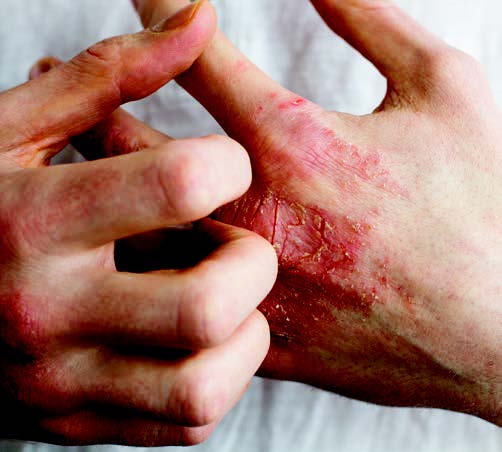The Mind-Skin Connection
As printed in the November 2022 edition of East Fishkill Living magazine.
A 9-year-old with patches of hair missing from her scalp. A 16-year-old with picked acne pimples, erosions and scars on her face. A 34-year-old with recurrent cold sores on his face. A 56-year-old with recurrent hives.

Over 25 years of dermatology practice, I have learned that many dermatology conditions like these might not be straightforward. The evidence is in: Mental well-being impacts the skin.
Many studies have investigated how stress and mental health influence the skin. Its behavior is heavily influenced by our emotions and hormones. Being stressed or nervous creates physiological changes like water loss, increased redness, increased sebum production and histamine release. Those under emotional stress recover slowly from skin problems, and many inflammatory skin problems will worsen. In a cruel twist, the stress of seeing these rashes may cause even more stress, worsening the condition.
Research shows that 13 percent or more of dermatology patients have anxiety disorders. Anxiety makes the skin“more sensitive and penetrative” and is thought to indirectly exacerbate certain skin disorders. Anxiety has been linked to skin rashes and hives and shown to trigger flares of conditions like herpes simplex, psoriasis, eczema and acne.
THE EFFECT OF STRESS
With these patients, a successful dermatology appointment takes more than just writing a script for a prescription to make things magically “go away.” Because so many dermatological conditions are fueled by stress, discussing its effect is an important part of helping the patient. Many office encounters are spent having more meaningful conversations about how stress and the mind may be contributing to their skin disease.We discuss how what is appearing on the skin’s surface is just the “tip of the iceberg.” Patients are sometimes unaware that they are pulling the hair out of their scalp (trichotillomania),excoriating their skin excessively (prurigo nodularis) or picking acne and creating scars (acne excoriee). On the other hand, some patients are 100 percent aware and admit to their obsessive picking during moments of stress for relief.
These are conversations we as dermatology providers must have with our patients. The patient’s acknowledgment of the psychological influence on their dermatology condition is an essential first step in their treatment plan. Next is to attempt to break the compulsive behavior and help lessen the anxiety by prescribing medications (SSRIs like Zoloft, Paxil, etc.) and incorporating behavior modification with the help of a mental health professional.
Sensitive, complex appointments like these cannot be rushed. Unfortunately, in medicine today, so many practices have gotten larger, more sterile, more commercialized and more of an assembly line with a less personal touch. How can patients get better if many diseases are psychologically based?
EASING THE ANXIETY
When developing The Art of Skin dermatology practices, addressing the mind-skin connection was at the heart of the concept. The office environment is European-themed, with soothing ambient lighting, stylish furniture and unique wall art. French music plays throughout the rooms. Patients are impressed by the stellar customer service, never feeling like they are in a doctor’s office but rather in a spa. This environment helps ease the anxiety associated with medical procedures and foster discussions related to psychologically associated dermatological conditions. Here, patients have a non-judgmental environment in which they can open up, be heard, and never feel like they are being rushed out the door.
During my years of clinical practice, my mission has been to build strong, authentic relationships with patients through meaningful interactions. Those relationships as a foundation have proven to be helpful when the unforeseen twists and turns of life cause skin manifestations to surface. Our doors are always open to new patients with anxiety induced dermatology conditions. Our practice exists to make it easier for patients to have access to all aspects of dermatology care. One thing is for certain: it’s truly an art to bring people through the hardest psychology dermatology issues.
Written by: Tania Cohen, DMSC, PA-C




